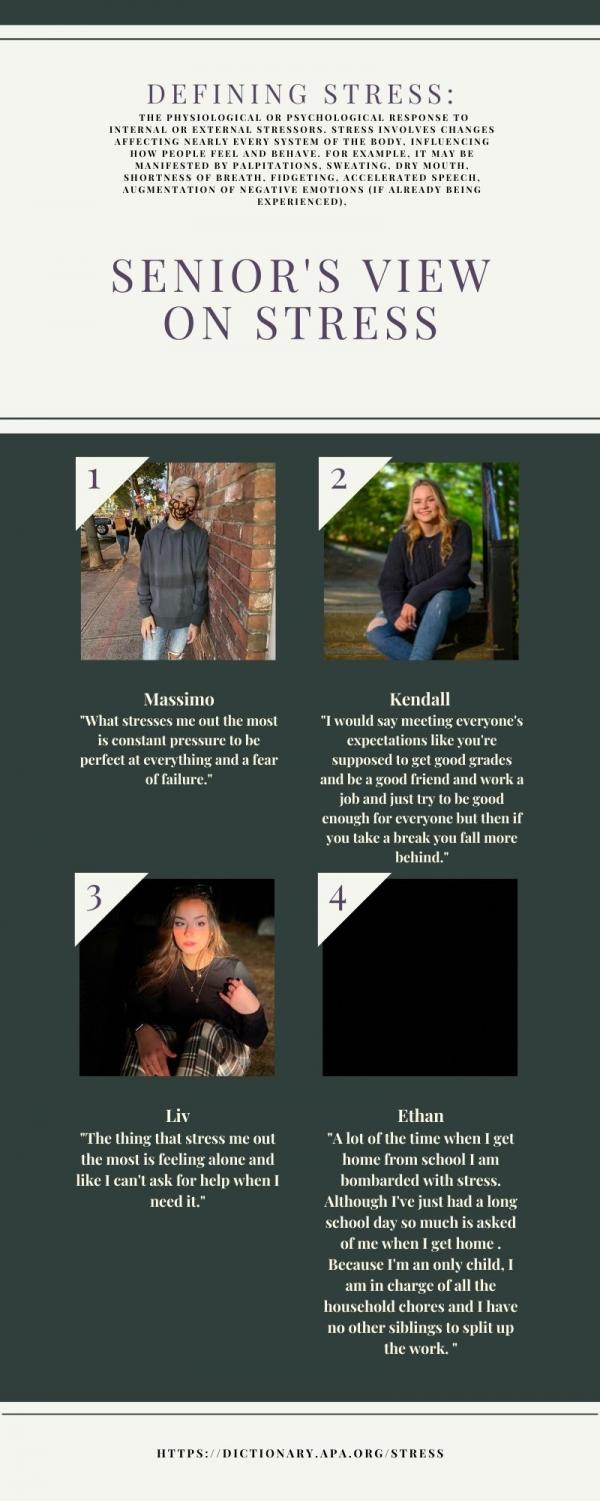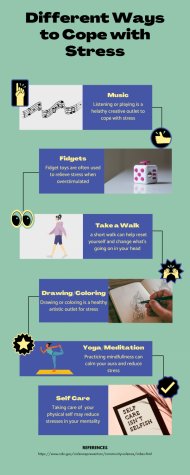
The crisp brown leaves scurry in the frigid wind as a new season is brought to us, and along with that comes the familiar smell of stress. For some, it may be seasonal, and for others it may be non-stop, spending every waking moment feeling overwhelmed, as if they are drowning. This feeling can be constant, and before it becomes unbearable, those who suffer should know there are ways to diminish this feeling, and a way to get out from underwater.
When struggling with an overwhelming amount of stress, the first step to relief is acknowledging the feelings. Stress affects every person in different ways and while stress may sometimes feel unbearable, it is not.
House Four counselor Sarah Doherty has been working as a school counselor for twelve and a half years and has seen stress and burnout first hand. Though students may feel as though their stress is debilitating, Doherty takes a look at the bright side and explains that stress may not be as bad as some believe.
“I think [stress] definitely is helpful because it can sort of help develop your personality and the ways that you handle different situations,” Doherty said. “The situations that cause you stress can give you some life skills you need once you’re out of public school and more on your own, it can help figure out the coping skills you need and what works for you.”
While stress may be considered a way to develop coping skills, it is not a good feeling to be living with constantly. If one finds themselves caught up in a moment where their stress is becoming overwhelming, take a step back and identify the situation. There are things that can be done to calm down and reduce stress. Although the pressure may feel overpowering at times, most students are able to cope better than they think.
“I think you guys do a better job of managing stress than you often think you do,” Doherty said. “I think when a bunch of things pile up and pile up, whether that’s school work, whether that’s time management and not knowing how to balance extracurriculars, work, and schoolwork, you can get to a point when you’re like ‘Oh my goodness how do I figure this out’ and oftentimes you guys figure it out on your own.”
Doherty’s advice for managing stress would consist of finding out what works best for you individually.

“It’s different for everyone, it depends, if reading or listening to music works for you, [or] going for a walk,” Doherty said. “Even if you ask your teacher when you’re feeling stressed to go for a quick two-minute walk it can help reset yourself and change what’s going on in your head. Different fidgets work for some people, talking to friends or parents are some of the easier things to do.”
Stress can be prolonged over extended periods of time so even momentary relief is something that feels so great to achieve. Stress tends to be a very prevalent emotion and occurrence in the life of students. It is understandably difficult for an individual to single-handedly manage the stress that comes along with schoolwork, a job, and even problems at home. From Doherty’s perspective, it is very important for counselors to “acknowledge the fear that comes along with reaching out,” and that it’s a big step towards managing stress because it is nearly impossible to do it alone.
Luckily at LHS, there are resources to help students who are struggling. Not only can counselors converse with you and help work through problems, they can also refer outside resources to continue aiding students outside of the school.
“It depends on the situation, but as a counselor, you try to have an honest conversation with them and help them perspective take in a situation,” Doherty said. “If they’re struggling emotionally and academically it’s always good to get to the point where you can notify the parents and have that conversation and check up on them. If they’re really struggling we have different resources here to help students work through whatever they’re dealing with.”
Kate Martin, the school to community counselor, is an available resource to help with the process of going into counseling outside of school. There are also connections in school to a mobile crisis response team that can aid in immediate emergency mental health crises.
No matter what someone is going through it is important to remember nobody on this earth is alone. There are nearly 8 billion people in this world and each and every one of them deserves someone to talk to and that is why Doherty believes, especially as a counselor, “it’s important to build relationships.”
“Sometimes it’s just the fact of talking to them and building that rapport so over time they feel comfortable and oftentimes after just a couple conversations students will come down and talk and talk and talk and get what they need to get off their chest,” Doherty said. “That’s what I like about working at a high school, it’s those real conversations, and you can work through situations with students, developing coping skills and reframing the way they look at something. And if things continue and they need more assistance there are sources we can reach out to provide that.”





![Carol Ritchie helps one of her students through a computer assignment during A period. Ritchie has taught students basic English with activities to help them get a better grasp of concepts. problem-solving skills in her classroom. “I try to make the class fun and find [activities] that interest them,” Ritchie said.A banner of the world map and flags hangs near ESOL teacher Ms. Ritchie’s desk. (Image made in Canva by Kelsey Sweet).](https://www.lancerspiritonline.com/wp-content/uploads/2025/06/Light-Green-Featured-Jewelry-Instagram-Post.jpg)









